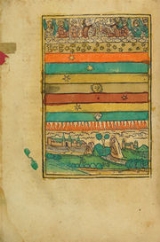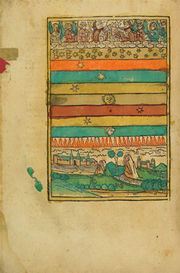
Konrad of Megenberg
Encyclopedia
Konrad of Megenberg (Latin
: Conradus Megenbergensis) (1309–1374) was a German
Catholic scholar, and a versatile writer.
, or Mebenburg, both in Franconia
now Bavaria
, on 2 February 1309. The dates of birth and death are not absolutely certain, and Konrad himself calls his native place Megenberg. He studied at Erfurt
and Paris
; at the latter university he obtained the degree of Master of Arts
, and he taught philosophy and theology there for several years.
In 1337 he was named head of St. Stephen's school at Vienna
. From 1342 he lived at Regensburg
, in Bavaria, where he was first a parish priest, proving himself to be an able preacher. Later he became a cathedral canon, and member of the town council. In 1357 he made a journey to the Papal Curia in 'Babylonian exile' at Avignon
. He died at Ratisbon (and alternative name for Regensburg) on 11 April 1374.
 Konrad was one of the most prolific German writers of the fourteenth century. His best-known and most widely read work is his "Buch der Natur", which is still of importance for the history of culture. According to his own statement he was engaged in writing it in 1349. A Latin work, De naturis rerum, of the Dominican
Konrad was one of the most prolific German writers of the fourteenth century. His best-known and most widely read work is his "Buch der Natur", which is still of importance for the history of culture. According to his own statement he was engaged in writing it in 1349. A Latin work, De naturis rerum, of the Dominican
Thomas of Cantimpré
(d. 1263), served as model. Konrad, however, prepared his book with considerable freedom; much of the original was omitted, his own observations were introduced, corrections were made, and so on. His work gives a survey of all that was known of natural history at that time and is, besides, the first natural history in the German language. It was widely read up to the sixteenth century, and numerous manuscript copies of it are still extant, eighteen being at Munich
. The first printed edition with a date is of 1475, and was issued at Augsburg
from the shop of Hans BŠmler, under the title of "Puch der Natur". It was printed at least six times before 1500; some of the editions were illustrated, all are now rare incunabula. A new edition of the original text was issued by Franz Pfeiffer (Stuttgart, 1861), with an introduction; an edition in modern German was edited by H. Schulz (Greifswald, 1897).
The work has 8 chapters
Of Konrad's numerous other writings there should be mentioned:
In his writings Konrad shows himself to be a strong adherent of the pope, an opponent of the philosophy of Occam
, and a stern critic of the moral failings of his age and of the clergy.
Latin
Latin is an Italic language originally spoken in Latium and Ancient Rome. It, along with most European languages, is a descendant of the ancient Proto-Indo-European language. Although it is considered a dead language, a number of scholars and members of the Christian clergy speak it fluently, and...
: Conradus Megenbergensis) (1309–1374) was a German
Germans
The Germans are a Germanic ethnic group native to Central Europe. The English term Germans has referred to the German-speaking population of the Holy Roman Empire since the Late Middle Ages....
Catholic scholar, and a versatile writer.
Biography
Konrad was born probably at Mainberg, near SchweinfurtSchweinfurt
Schweinfurt is a city in the Lower Franconia region of Bavaria in Germany on the right bank of the canalized Main, which is here spanned by several bridges, 27 km northeast of Würzburg.- History :...
, or Mebenburg, both in Franconia
Franconia
Franconia is a region of Germany comprising the northern parts of the modern state of Bavaria, a small part of southern Thuringia, and a region in northeastern Baden-Württemberg called Tauberfranken...
now Bavaria
Bavaria
Bavaria, formally the Free State of Bavaria is a state of Germany, located in the southeast of Germany. With an area of , it is the largest state by area, forming almost 20% of the total land area of Germany...
, on 2 February 1309. The dates of birth and death are not absolutely certain, and Konrad himself calls his native place Megenberg. He studied at Erfurt
Erfurt
Erfurt is the capital city of Thuringia and the main city nearest to the geographical centre of Germany, located 100 km SW of Leipzig, 150 km N of Nuremberg and 180 km SE of Hannover. Erfurt Airport can be reached by plane via Munich. It lies in the southern part of the Thuringian...
and Paris
Paris
Paris is the capital and largest city in France, situated on the river Seine, in northern France, at the heart of the Île-de-France region...
; at the latter university he obtained the degree of Master of Arts
Master of Arts (postgraduate)
A Master of Arts from the Latin Magister Artium, is a type of Master's degree awarded by universities in many countries. The M.A. is usually contrasted with the M.S. or M.Sc. degrees...
, and he taught philosophy and theology there for several years.
In 1337 he was named head of St. Stephen's school at Vienna
Vienna
Vienna is the capital and largest city of the Republic of Austria and one of the nine states of Austria. Vienna is Austria's primary city, with a population of about 1.723 million , and is by far the largest city in Austria, as well as its cultural, economic, and political centre...
. From 1342 he lived at Regensburg
Regensburg
Regensburg is a city in Bavaria, Germany, located at the confluence of the Danube and Regen rivers, at the northernmost bend in the Danube. To the east lies the Bavarian Forest. Regensburg is the capital of the Bavarian administrative region Upper Palatinate...
, in Bavaria, where he was first a parish priest, proving himself to be an able preacher. Later he became a cathedral canon, and member of the town council. In 1357 he made a journey to the Papal Curia in 'Babylonian exile' at Avignon
Avignon
Avignon is a French commune in southeastern France in the départment of the Vaucluse bordered by the left bank of the Rhône river. Of the 94,787 inhabitants of the city on 1 January 2010, 12 000 live in the ancient town centre surrounded by its medieval ramparts.Often referred to as the...
. He died at Ratisbon (and alternative name for Regensburg) on 11 April 1374.
Works

Dominican Order
The Order of Preachers , after the 15th century more commonly known as the Dominican Order or Dominicans, is a Catholic religious order founded by Saint Dominic and approved by Pope Honorius III on 22 December 1216 in France...
Thomas of Cantimpré
Thomas of Cantimpré
Thomas of Cantimpré was a Roman Catholic medieval writer, preacher, and theologian.-Biography:...
(d. 1263), served as model. Konrad, however, prepared his book with considerable freedom; much of the original was omitted, his own observations were introduced, corrections were made, and so on. His work gives a survey of all that was known of natural history at that time and is, besides, the first natural history in the German language. It was widely read up to the sixteenth century, and numerous manuscript copies of it are still extant, eighteen being at Munich
Munich
Munich The city's motto is "" . Before 2006, it was "Weltstadt mit Herz" . Its native name, , is derived from the Old High German Munichen, meaning "by the monks' place". The city's name derives from the monks of the Benedictine order who founded the city; hence the monk depicted on the city's coat...
. The first printed edition with a date is of 1475, and was issued at Augsburg
Augsburg
Augsburg is a city in the south-west of Bavaria, Germany. It is a university town and home of the Regierungsbezirk Schwaben and the Bezirk Schwaben. Augsburg is an urban district and home to the institutions of the Landkreis Augsburg. It is, as of 2008, the third-largest city in Bavaria with a...
from the shop of Hans BŠmler, under the title of "Puch der Natur". It was printed at least six times before 1500; some of the editions were illustrated, all are now rare incunabula. A new edition of the original text was issued by Franz Pfeiffer (Stuttgart, 1861), with an introduction; an edition in modern German was edited by H. Schulz (Greifswald, 1897).
The work has 8 chapters
- the nature of man
- sky, 7 planets, astronomy and meteorology
- zoology
- ordinary and aromatic trees
- plants and vegetables
- invaluable and semi-precious stones
- 10 kinds of metals
- water and rivers.
Of Konrad's numerous other writings there should be mentioned:
- the "Sphære" 'Spheres', a small compendium in German of astronomyAstronomyAstronomy is a natural science that deals with the study of celestial objects and phenomena that originate outside the atmosphere of Earth...
and physicsPhysicsPhysics is a natural science that involves the study of matter and its motion through spacetime, along with related concepts such as energy and force. More broadly, it is the general analysis of nature, conducted in order to understand how the universe behaves.Physics is one of the oldest academic...
, prepared from the Latin work of Joannes Sacrobosco - some poems, including "Planctus ecclesiæ in Germania" (1337)
- a hymnHymnA hymn is a type of song, usually religious, specifically written for the purpose of praise, adoration or prayer, and typically addressed to a deity or deities, or to a prominent figure or personification...
in praise of the Virgin - a work on morals, "Speculum felicitatis humanæ" 'mirror of human happiness' (1348)
- "De erroribus Begehardorum et Beguinarum" 'about the errors of BeghardsBeghardsBeghards and Beguines were Roman Catholic lay religious communities active in the 13th and 14th centuries, living in a loose semi-monastic community but without formal vows...
and Beguines' - "De translatione imperii" (1355) on the translatio imperiiTranslatio imperiiTranslatio imperii, Latin for "transfer of rule", is a concept invented in the Middle Ages for describing history as a linear succession of transfers of imperium, that is of supreme power concentrated with a series of single rulers .-Origin:...
, i.e. 'succession' of empires - the large work "Oeconomica", written between 1353 and 1363
- "Tractatus contra mendicantes ad Papam Urbanum V" 'treatise against mendicant (order)s addressed to Pope Urban VPope Urban VPope Urban V , born Guillaume Grimoard, was Pope from 1362 to 1370.-Biography:Grimoard was a native of Grizac in Languedoc . He became a Benedictine and a doctor in Canon Law, teaching at Montpellier and Avignon...
- several biographies of saintsHagiographyHagiography is the study of saints.From the Greek and , it refers literally to writings on the subject of such holy people, and specifically to the biographies of saints and ecclesiastical leaders. The term hagiology, the study of hagiography, is also current in English, though less common...
- some historical treatises, chiefly dealing with the local history of Ratisbon.
In his writings Konrad shows himself to be a strong adherent of the pope, an opponent of the philosophy of Occam
William of Ockham
William of Ockham was an English Franciscan friar and scholastic philosopher, who is believed to have been born in Ockham, a small village in Surrey. He is considered to be one of the major figures of medieval thought and was at the centre of the major intellectual and political controversies of...
, and a stern critic of the moral failings of his age and of the clergy.

